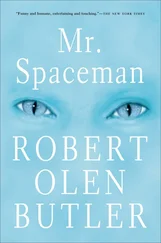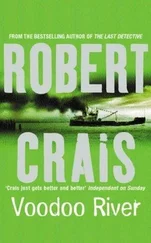She glances over her shoulder.
Robert is disappearing through the door into the visitation room foyer. Peggy is approaching two elderly couples Darla does not recognize.
And Peggy reaches these strangers now, the two old men and, apparently, their two wives. The women are rising from the chesterfield.
“Hello,” she says.
The two men turn.
“Thank you for coming.” She speaks with the exaggerated brightness of decorous disdain: These men are the first outsiders to mourn her husband, and she has never heard a word about them.
“I’m Peggy Quinlan,” she says.
At least they seem to recognize who she is. As soon as they all finish fluttering their names and their condolences at her, Peggy ignores the wives and looks from one veteran to the other as she says, “Remind me where Bill first met you.”
“Over at the American Legion hall.”
Neither has Bill ever mentioned the American Legion, much less its hall.
Peggy certainly has no intention of revealing her ignorance of all this. Fortunately, her three friends from church have finished in the kitchen and are now entering the room through its double door from the back hallway.
Peggy nods in the direction of their arrival. “You’ll excuse me.”
The strangers clamor their understanding.
She takes each of their offered hands and says, “Please step into the next room and have some food. There’s Irish stew. It was Bill’s favorite. Perhaps you knew?” She does not pause to have that confirmed or denied. Either way it would piss her off. “Or there are plenty of other things. Please.”
The veterans and their wives all agree to eat.
Peggy moves off toward her friends from St. Mary’s Catholic Church. They’ve taken a turn toward the casket, but the steps of her pursuit slow as she finds her mind accelerating to a thing she thought she left behind in New Orleans, a thing surely already dead, dead on its own, a thing that certainly has no business in her life now, not with the man himself dead, but it does have a life. It very much does. Because if he moved to Georgia and found these two men for friends and she never heard a word about them, then it proves he was capable of a private life full of people he kept from her. Worse. It proves everything she feared in New Orleans, feared for decades: His going off most every afternoon wasn’t simply for a drive and some coffee. It was for a woman. A woman he loved. Loved instead of her.
She has slowed now to a stop.
Ahead of her, the three friends are lined up before Bill.
She turns her back on them.
The strangers are heading for the food. Robert has vanished. Darla is in the process of vanishing as well, out the entrance door of the visitation room.
And Jimmy once again nears the Tillotson Funeral Home, featuring William Quinlan like the star of his latest movie— Husband, Father, Veteran. Jimmy and Heather have been chased back by the Impala’s open fresh air vent. A few miles down Apalachee Parkway it sucked in the nighttime stink of the tree-shrouded Leon County dump, a clear sign to both of them that they should give up the drive.
He pulls into the first empty space, far from the few other cars and the floodlit house.
He turns off the engine but does not move.
Heather says, “Cold feet?”
“The back of the crowd at the cemetery is one thing. But doing this … I don’t know.”
“Baby,” she says. “You want to put him in the ground, not just a casket. You need to see him in it, don’t you think?”
Jimmy shrugs in a slow-motion, exaggerated, high-shouldered way.
Heather smiles. She’s known him long enough to understand the gesture as pouty assent. She finds it endearing, which makes her suspect she’s falling in love.
He says, “We’re still too early.”
“So let’s sit here and make out for a while,” she says.
Jimmy barks a laugh at this.
But he turns a little in her direction and regrets the ubiquity of center consoles in modern cars. “We’d have to climb into the backseat to do it right,” he says.
“So?”
“On the way out,” he says. “After getting him into the casket.”
Heather laughs and leans across the console to him. She initiates a kiss, which they draw out for a time and end with as much of an embrace — of shoulders and chests — as they can manage. Jimmy’s attention drifts up to the funeral home. But it’s far enough away that he does not even register the figure silhouetted in the open front doorway.
Robert has only moments ago slipped his cellphone into his pocket, having absentmindedly carried it in his hand from the visitation room to this place in the doorway. The text message that brought him here was sent by his grandson. Almost there. The message pleased Robert, and surprised him a little. If they’re almost here, there’s no reason for Jake to text, except that he’s eager to see his granddad.
Far down at the parkway, lights have just turned into the parking lot, but they immediately pull into a spot and go dark. Clearly not Kevin. Nor is it Kevin at the opening and shutting of doors much closer. Figures from school are emerging there.
“Are you okay?” This is Darla’s voice from just over his shoulder.
He glances at her. “Yes. Thanks. I got a text from Jake. They’re almost here.”
Darla steps up beside him.
Four FSU colleagues, three of Robert’s, one of Darla’s, are heading this way.
She feels Robert fidget a little. “I’ll handle them, if you like,” she says.
“Thanks. Yes.”
And after the commiserations, she does, taking them away to the food and alcohol that make this a wake and not a funeral.
More lights turn in now from the parkway and keep approaching until they angle into the nearest parking spot. Robert goes out into the chill and down the front steps to meet Kevin, who is striding forward, looking young in the dim light, not forty-two, looking like a college boy. He embraces Robert. Grace follows and puts her arms around both of them. A tender woman. Good for Kevin. Robert withdraws one arm from his son to include his daughter-in-law in his embrace.
The death of his father is grieved more simply by these two, who did not know the man, who knew an alternate man. Robert looks beyond this wordless huddle. Molly is on her cellphone; she’s eighteen, after all. Jake is standing nearby watching Robert closely. Their eyes meet and the boy nods to his grandfather.
How has this boy gotten so big? This man. Twenty now. He’s taller than Robert. Maybe not when Robert was twenty, not before his septuagenarian shrinkage. But tall. A man. And Robert wonders how this is now a surprise. As the hug goes wordlessly on, Robert tries to think of the last time he saw his grandson. A year. Maybe two. Jake’s been elsewhere during the family’s last couple of visits. Growth spurts have their limits. The last time, Jake surely was some significant fraction of this man who stands before Robert. But it was long enough ago that the near-man has been composted into this present surprise.
Grace begins the exchange of condolences. “I’m so sorry, Dad,” she says.
The three end the embrace and exchange ardent words as they all gather and turn and move off toward the front door.
Bob cannot distinguish the words but this faint flurry of sound floats down the parking lot to him. He has just stopped abruptly at the foot of the Tillotson driveway. The lights of the marquee have drawn his eyes up from their focus on the sidewalk and have stopped him, and now these distant voices come at him like a past incident that troubles you in the middle of the night but you can’t quite remember what it was. And the lights. This sign. William Quinlan. Quinlan. Bob thrashes in his head to understand. Just recently a Quinlan. A handshake. I’m Quinlan. The Vietnam vet. Vietnam. America’s last chapter. Bang. Done.
Читать дальше












